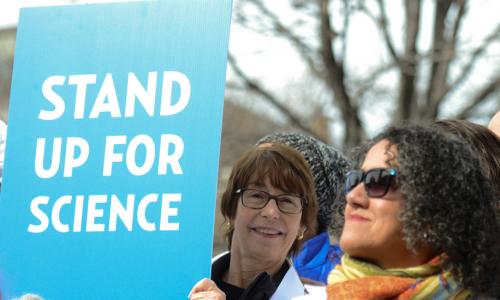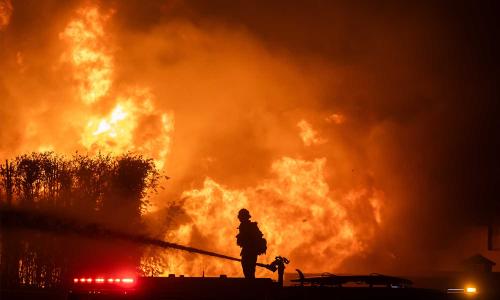President Biden promised to act on climate change. Scientists and experts offered a path forward.
In this open letter, we highlighted five important steps for meeting the nation's climate targets. We delivered the letter to the White House on April 14, 2021, ahead of the Earth Day Summit on Thursday, April 22.
An Open Letter to President Biden
To: President Joe Biden
As scientists, engineers, and public health experts, we welcome the important early steps you have taken to lay the groundwork for science-based policymaking, including rejoining the Paris Agreement and halting or reversing harmful regulatory rollbacks. Devastating climate impacts are already unfolding across the country and around the world. The science shows we must take bold actions now to sharply reduce heat-trapping emissions, limit climate change, and protect public health. As we endeavor to build a safer, more resilient world, centering the voices and needs of communities disproportionately impacted by environmental and climate injustices is essential.
The global effort to limit warming to well below 2° Celsius, as called for in the Paris Agreement, has reached a critical point. Worldwide heat-trapping emissions are still far above where they need to be to stave off the worst climate harms. The United States, as one of the world's biggest contributors to global heat-trapping emissions, must take responsibility and commit to cutting its emissions by at least 50 percent below 2005 levels by 2030 and transitioning to a net-zero emissions economy no later than 2050. This goal is both technically feasible and necessary—now we need action.
We now call on your administration, working with Congress, to take strong, concrete measures across the economy to ensure the United States will meet this robust target. Emission reductions from the transportation and power sectors—the two leading sources of US heat-trapping emissions—must be prioritized, along with investments and policies that create good-paying jobs and further climate resilience, environmental justice, and racial equity.
To deliver on these emission-reduction goals, we strongly urge you to take the following near-term tangible actions:
- Aim for a transition to a 100 percent carbon-free power sector by 2035, through supportive policies and increased investments in energy efficiency, renewable energy, a modernized electricity system, transmission, energy storage, and clean energy research and development.
- Set strong long-term standards that reduce carbon pollution from passenger cars and trucks by at least 60 percent and ensure at least 50 percent of new vehicles sales are electric by 2030. Also increase investment in sustainable, equitable transportation infrastructure.
- Enact strong pollution standards that put us on track to have all new trucks and buses be zero-emission by 2040, which will also reduce dangerous air pollution.
- Sharply limit methane emissions from oil and gas production, processing and distribution.
- Enable farmers and eaters to be part of the solution by investing in equitable research and assistance programs that advance sustainable farming systems, build soil health, sequester carbon, and reduce food and farm emissions.
Frontline communities—the neighborhoods at the greatest risk from climate change—are disproportionately low-income communities and communities of color. As we transition to a low-carbon economy and help the nation prepare for worsening climate impacts, we need to ensure that policies are created in partnership with these frontline communities, and that they receive sufficient investments quickly. Keeping communities safe in the decades ahead will require a national resilience and adaptation strategy, community access to legal means for holding fossil fuel polluters accountable, and the enhancement and enforcement of existing public health safeguards, including the clean-up of toxic pollution.
Additionally, in places where the local economy has been historically dependent on coal or other fossil fuels, the administration should establish a comprehensive and well-funded long-term transition package for workers and communities. Investments in frontline communities need to go beyond preventing future harm by also removing existing barriers to physical and economic mobility and ensuring people can thrive in their neighborhoods.
We need to act now to protect our air, water, and land; improve public health; and limit the worst impacts of climate change for future generations. We can do this while creating millions of good-paying jobs and a strong, resilient economy. We thank you for your leadership on climate action and urge you to use these science-based recommendations to guide your administration's priorities.
Sincerely,
Institutional affiliations are listed as provided by signers for identification purposes only, and do not imply endorsement of the letter by those institutions.
Brenda Ekwurzel, PhD
Senior Climate Scientist, Director of Climate Science
Union of Concerned Scientists
Co-Author, Fourth National Climate Assessment Volume II; AAAS Fellow
Michael E. Mann, PhD
Distinguished Professor of Atmosphere Science
Pennsylvania State University
Lead Author, IPCC Third Assessment Report; AAAS Fellow; NAS Member
Joel Clement, MSc
Senior Fellow
Harvard Kennedy School
Senior Fellow, Union of Concerned Scientists
Benjamin D. Santer, PhD
Climatologist and Atmospheric Scientist
John D. and Catherine T. MacArthur Fellowship; Member, US National Academy of Sciences; Recipient of the Procter Prize; Convening Lead Author, Chapter 8, IPCC Second Assessment Report
Lauren Edwards, MSc
Executive Director, 500 Women Scientists
Director, Fellowship for the Future
T. Jane Zelikova, PhD
Research Scientist, University of Wyoming
Co-founder, 500 Women Scientists
AAAS Fellow
Peter Frumhoff, PhD
Director of Science and Policy, Chief Climate Scientist
Union of Concerned Scientists
Lead Author, IPCC Fourth Assessment Report;
Anne R. Kapuscinski, PhD
Director, Coastal Science and Policy Program
Professor of Environmental Studies
University of California, Santa Cruz
Chair, Board of Directors, Union of Concerned Scientists; Pew Fellow in Marine Conservation; Winner, Ocean Awards 2019: Innovation
Paul R. Ehrlich, PhD
President, Center for Conservation Biology
Bing Professor Emeritus of Population Studies
Stanford University
Cafoord Laureate; NAS Member; Royal Society Fellow
Thomas Kailath, PhD
Hitachi America Professor of Engineering, Emeritus
Stanford University
National Medal of Science Recipient; IEEE Medal of Honor Recipient; Member, National Academy of Sciences; Member, National Academy of Engineering
David H. Michaels, PhD, MPH
Professor of Environmental and Occupational Health and Epidemology
George Washington University School of Public Health
Former Assistant Secretary of Labor, Occupational Safety and Health Administration
Recipient, AAAS Scientific Freedom and Responsibility Award; Recipient, APHA David P. Rall Award for Advocacy in Public Health
Tom Lubensky, PhD
Christopher H. Browne Distinguished Professor of Physics
University of Pennsylvania
Member, National Academy of Sciences; Member, American Academy of Arts and Sciences; Recipient, Oliver E. Buckley Prize of the American Physical Society



